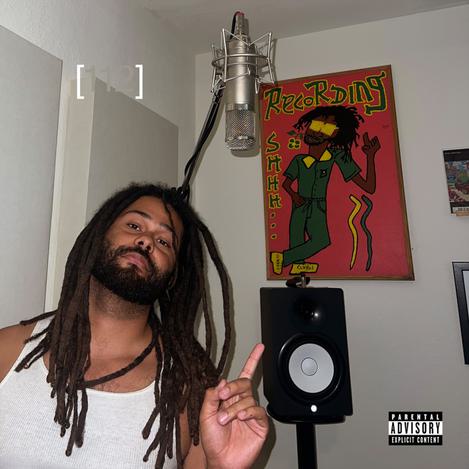Triple Digits [112] is RiTchie’s messy, inventive solo debut
"Triple Digits [112]"

As RiTchie has discovered, becoming an avant-garde pioneer of underground hip-hop is hard work.
With fellow emcee Stepa J. Groggs and producer Parker Corey, RiTchie came up recording invigorating, creative jazz rap under the band Injury Reserve; that early work marked the group as one of the most interesting acts in the mid-2010s rap underground. Injury Reserve planned to release their experimental opus By the Time I Get to Phoenix in 2020, just a year after their glitchy, hardcore self-titled debut album, but Groggs’s unexpected, tragic death that year sent the band into a mournful yearlong silence.
The album, ultimately released in late 2021, was largely recorded before Groggs’s death, but it still has an aura of surreal, mortal tragedy about it. It’s also one of the most avant-garde, abstract albums in recent memory: not just in rap, but in music altogether. The album was so strange and unlabelable that some thought up a new name – post-rap – to describe it.
Now releasing music as By Storm, RiTchie and Corey have started work on a debut album. But, as RiTchie found out, it isn’t easy to record a serious, emotionally devastating, experimental opus twice in a row without taking a bit of a creative break. So, instead, he recorded Triple Digits [112].
According to RiTchie, Triple Digits [112] started as a “personal outlet,” a way to create music more loose and “lighthearted” than his work with Corey under the Injury Reserve and By Storm monikers. And the album, for worse and (mostly) for better, is looser than anything RiTchie has released in years. Its production is more free-flowing, the rapping somewhat more unserious; the overall presentation more closely resembles a DIY debut mixtape than the creative output of one of the most avant-garde rappers working today. But, despite the album’s lack of cohesion or consistency, Triple Digits is a remarkably good album full of the unbridled creativity that has driven RiTchie to experimental rap stardom.
The first notable thing about Triple Digits is its production. The album brings together a scrappy array of underground producers – from 18-year-old hyper-rap pioneer FearDorian to New York rapper AJRadico to Nico Chiat of the budding emo band Blair. It’s a fascinatingly incongruous list of collaborators, and the album’s diversity in sound reflects that. To be fair, eclectic musical themes aren’t new for RiTchie: Injury Reserve was great because it brought diverse styles under an aesthetically cohesive umbrella. But Triple Digits has no such cohesion. It’s a deeply broad album, almost to the point of confusion.
That’s not to say that it makes no sense. At the very least, the album is well thought-out as a full listen: it opens with an interspersal of jazzy bangers and more quiet electronic rap cuts before mellowing out and pivoting almost entirely to the latter sound in the second half. The higher-energy cuts on this album are particularly great: lead single “RiTchie Valens” hits with rage-inspired buzzing synths, persistent refrains of “Ritchie!” reminiscent of an auto-tuned Pokemon saying its own name, and an infectious hook over the top of all of it. It’s simultaneously one of the catchiest songs RiTchie has released and one of the most confusing – it’s an overwhelming combination of sounds that works far better than it should. Some tracks are a bit more straightforward: “WYTD?!?!,” opens with a jazzy orchestra hit-esque loop, massive kick drums, and a repetition of the title: “So what’re you trying to do?!?!”. “Dizzy,” with Aminé, is the most accessible song RiTchie has released since Injury Reserve’s debut: it’s a wonderful, laid-back neo-soul banger, full of disses at the “local little ‘it’ n*gga” focused on trend-chasing more than their children. “If you would stick your neck out for anything / Why don't you get your girl a little diamond ring? / And maybe buy your kids all some new clothes / ‘Cause you be staying fresh, but they got holes,” RiTchie raps. Aminé turns in a standout verse and keeps taking shots at the stuck-up: “Look, you the type to link-and-build at a urinal / Your granny died, you taking fit pics at the funeral”.
Triple Digit’s more mellow cuts, which comprise a bulk of the album, are comparatively more hit-or-miss. Some tracks, like album closer “5onthe.” – which features lethargic auto-tuned rapping and two sustained synth chords repeated ad nauseam – don’t feel like they go much of anywhere. But, at its best, the tracks channel the same creative energy as Injury Reserve’s best work. For example, “Looping” mixes quiet jazzy pianos with subtle-yet-scattered drum programming and similarly frenzied rapping: “I hear so many tones / I feel so many ways / I feel so very broke / Right when I catch the beat”.
Overall, I don’t like constantly comparing this album to the work of Injury Reserve – it has an entirely different energy than anything RiTchie has released with Corey. But in all honesty, it’s hard to compare this album with anything at all. It’s clear that the album is a passion project: it isn’t nearly as hi-fi as his past work, nor is it as consistent. But its strengths lie in the fact that, even if unpolished, it’s just as unique and interesting as anything he’s ever released.
It’s hard to say that Triple Digits lives up to the creative prowess of an album like By the Time I Get to Phoenix, but at the same time, it wasn’t meant to do that – broadly, it’s a loose album from someone who desperately needed more looseness in his life. It may feel underbaked at times, but Triple Digits is still overall one of the most creative albums of the year so far from one of the most creative minds in rap.
Get the Best Fit take on the week in music direct to your inbox every Friday

Lorde
Virgin

OSKA
Refined Believer

Tropical F*ck Storm
Fairyland Codex





